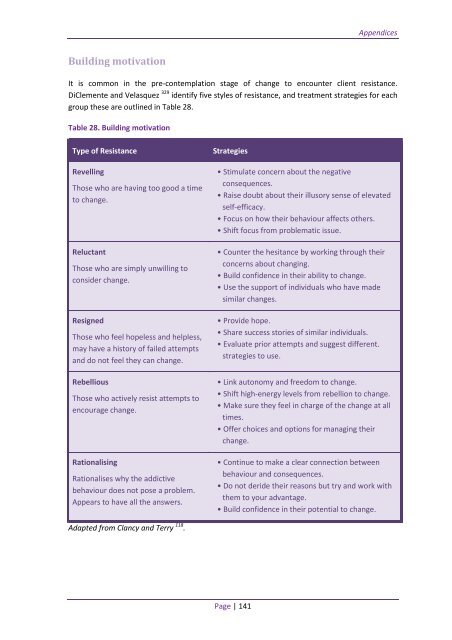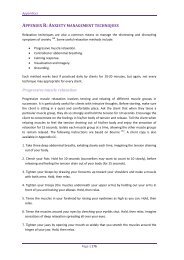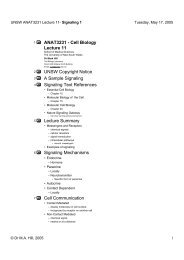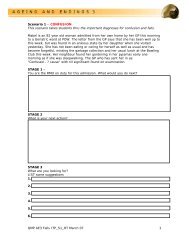appendix d: motivational interviewing - National Drug and Alcohol ...
appendix d: motivational interviewing - National Drug and Alcohol ...
appendix d: motivational interviewing - National Drug and Alcohol ...
Create successful ePaper yourself
Turn your PDF publications into a flip-book with our unique Google optimized e-Paper software.
Appendices<br />
Building motivation<br />
It is common in the pre-contemplation stage of change to encounter client resistance.<br />
DiClemente <strong>and</strong> Velasquez 329 identify five styles of resistance, <strong>and</strong> treatment strategies for each<br />
group these are outlined in Table 28.<br />
Table 28. Building motivation<br />
Type of Resistance<br />
Revelling<br />
Those who are having too good a time<br />
to change.<br />
Reluctant<br />
Those who are simply unwilling to<br />
consider change.<br />
Resigned<br />
Those who feel hopeless <strong>and</strong> helpless,<br />
may have a history of failed attempts<br />
<strong>and</strong> do not feel they can change.<br />
Rebellious<br />
Those who actively resist attempts to<br />
encourage change.<br />
Rationalising<br />
Rationalises why the addictive<br />
behaviour does not pose a problem.<br />
Appears to have all the answers.<br />
Strategies<br />
• Stimulate concern about the negative<br />
consequences.<br />
• Raise doubt about their illusory sense of elevated<br />
self-efficacy.<br />
• Focus on how their behaviour affects others.<br />
• Shift focus from problematic issue.<br />
• Counter the hesitance by working through their<br />
concerns about changing.<br />
• Build confidence in their ability to change.<br />
• Use the support of individuals who have made<br />
similar changes.<br />
• Provide hope.<br />
• Share success stories of similar individuals.<br />
• Evaluate prior attempts <strong>and</strong> suggest different.<br />
strategies to use.<br />
• Link autonomy <strong>and</strong> freedom to change.<br />
• Shift high-energy levels from rebellion to change.<br />
• Make sure they feel in charge of the change at all<br />
times.<br />
• Offer choices <strong>and</strong> options for managing their<br />
change.<br />
• Continue to make a clear connection between<br />
behaviour <strong>and</strong> consequences.<br />
• Do not deride their reasons but try <strong>and</strong> work with<br />
them to your advantage.<br />
• Build confidence in their potential to change.<br />
Adapted from Clancy <strong>and</strong> Terry 118 .<br />
Page | 141

















